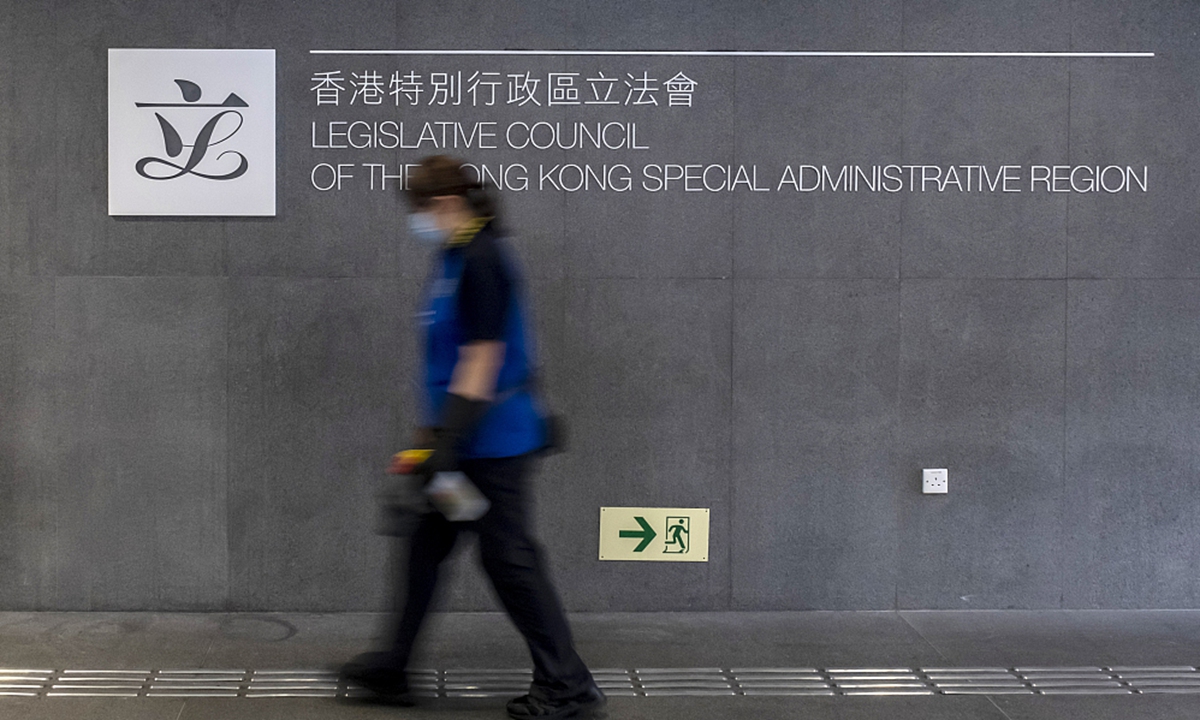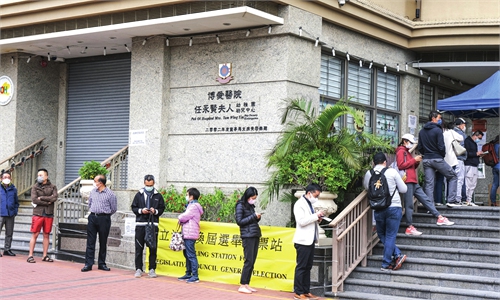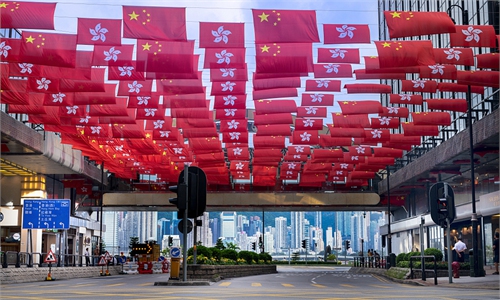New Hongkongers participate in HKSAR's LegCo elections to better communicate with the mainland: candidate

A cleaner walks past signage at the Legislative Council building in Hong Kong, China. File Photo: VCG
The elections for the seventh-term Legislative Council (LegCo) of the Hong Kong Special Administrative Region (HKSAR) kicked off on Sunday morning, the first since the improvement to the HKSAR's electoral system.
Many representatives of "new Hongkongers" also took part for the first time in these elections. For example, Wendy Hong, head of research at the New World Development Company Limited, who had previously served for more than five years as a Senior Researcher in the Central Policy Unit of the Hong Kong SAR Government.
New Hongkongers have become vital stakeholders in the city's economy but their participation in local politics is comparatively rare. As a group capable to communicate between Hong Kong and the mainland, they should stand out to make full use of their advantage, Hong said.
The new Hongkongers are those born in the mainland and now live and work in Hong Kong. Many of them work in finance, technology, research and education, but few participated in the LegCo elections. Besides Hong, other new Hongkongers who joined this year's elections include Tan Yueheng, Chairman and an Executive Director of BOCOM International Holdings Company Limited, and Wu Chili, assistant researcher at the Hong Kong Polytechnic University.
Hong told the Global Times that one of the reasons for the rare participation of new Hongkongers in politics is that they have not really integrated in local society. For instance, the work of people in the banking sector is to communicate between the mainland and the overseas so they do not need to know local society.
"My decision to take part in these elections is aimed to strive for the interests of the group and help them integrate," Hong said.
She said that many new Hongkongers started to think about doing something for the city since 2019. This is not for personal interest but for the determination to do something for the city taking into consideration their advantage in communicating the two sides.
"This sense of mission is also pushing me to take part in government and political affairs," Hong noted.
In these elections, Hong proposed a program to merge what she differentiates as "two Hong Kongs": one has all the advantages as an international financial center that enjoys benefits of national developments and is a winner of the globalization. The other, is faced with dilemmas, like weakening industry, widening gap between the rich and poor and limited career prospects for youngsters.
Hong told the Global Times that despite the impact of politics, education and media, the root of the anti-extradition bill movement in 2019 lies in the economy. In previous years, Hong Kong benefitted from globalization with advantage in the high-end service industry. But the benefits mostly went to the elites while the ordinary people did not receive much. "The split in the economy worsened the split in politics," Hong said.
Hong Kong is now trying to merge into the big picture of national development with the construction of the Guangdong-Hong Kong-Macao Greater Bay Area underway. However, many Hong Kong college graduates cannot understand that they do not have the capacity, resources and social network to compete in the mainland. So, at the same time that Hong Kong is sending talents and competitive industries to the mainland, it should bring some competitive industries back to create multiple employment opportunities for local youth. Under these circumstances, the younger generation would not need to leave its home city to feel the chance brought about by national development, which also wins the hearts of the people.
Another reason to join these elections, according to Hong, are the changes in Hong Kong. The central government is carrying out measures to solve problems in the SAR and its society is also shifting focus to the economy and employment. The previous LegCo elections were more like a war of positions and the voters also chose based on their viewpoints. But this time, candidates have to show people their ideas and propose solutions to economic problems and livelihood issues, Hong noted.
Hong added that this LegCo will relocate itself. There will not be an opposition to the administration and it will better play its role in assisting the administrative system. While supervising the HKSAR government, the LegCo also has to help the government to draw and implement policies as well as identify and solve problems.



